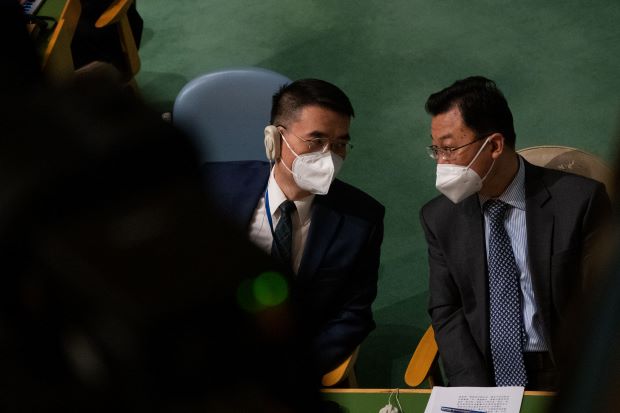China turns back move for UN debate on abuse of Uyghurs

By Nick Cumming Bruce
GENEVA — China defeated calls Thursday (6) for further scrutiny by the top human rights agency of the United Nations over abuses targeting the Uyghur people and other Muslim minorities in the Xinjiang region.
The United States and nine other Western countries had called for a debate in the UN Human Rights Council on a landmark assessment released in August by Michelle Bachelet, then the UN rights chief, which found China may have committed crimes against humanity in Xinjiang, in northwestern China.
The resolution failed by a vote of 19-17, with 11 of the council’s 47 members abstaining. To make the resolution easier for developing countries to support, the nations pushing for debate carefully avoided any reference to the findings of the August report and limited their objectives to a council debate.
“No country represented here today has a perfect human rights record,” the US ambassador, Michèle Taylor, told the council. “No country, no matter how powerful, should be excluded from council discussions — this includes my country, the United States, and it includes the People’s Republic of China.”
A debate on Xinjiang was the minimum step that council members could take in response to the UN report. The report had identified torture, sexual violence, suppression of religious freedom and disappearances on a massive scale.
But the United States and its allies really wanted much more than debate, said Chen Xu, China’s ambassador to the UN in Geneva. The resolution, he said, was an example of Western political manipulation of UN human rights bodies to smear China’s reputation and interfere in its internal affairs.
“Today China is targeted, tomorrow any other developing country could be targeted,” Chen said. All country-specific resolutions in the council, he added, focus on the developing world.
Those arguments resonated with habitual council allies such as Cuba, Eritrea and Venezuela, but also overcame doubts among Muslim countries. Indonesia, the world’s most populous Muslim state, voted against further debate, as did Pakistan, which often speaks in the council on behalf of the 57-country Organization of Islamic Cooperation. Among Muslim states only Somalia supported the resolution.
The vote was not a surprise for Western diplomats who had previously acknowledged that it would be close but had opted to risk defeat rather than remain silent on the atrocities exposed in the Xinjiang report. The report, produced after much delay and in the face of pressure from Beijing, was issued in the final hours of Bachelet’s tenure.
Despite the outcome, Western diplomats said the report would continue to be discussed and brought up in council discussions.
The World Uyghur Congress president, Dolkun Isa, swiftly criticized the vote as “a missed opportunity by council members to hold China to the same standard as other countries.” A statement by Uyghur groups emphasized that the council’s vote did not preclude action by other UN agencies and the global business community to act on the findings of the report.
The council’s action amounted to “an abdication of responsibility and a betrayal of Uyghur victims,” Sophie Richardson, China director of Human Rights Watch, said in a statement. But she argued that the closeness of the vote showed that a growing number of states were willing to put a spotlight on China’s human rights violations.
Thursday’s vote was a milestone in the proceedings of the 15-year-old Human Rights Council: The body had never previously targeted a permanent member of the UN Security Council. Thursday’s China resolution was the first of two aimed at permanent Security Council members.
On Friday (, the Human Rights Council will vote on calls for the appointment of an independent human rights expert to monitor the situation in Russia, in a resolution led by European countries.
Diplomats expect that there will be less resistance to Friday’s initiative, given revelations of atrocities by Russian forces in Ukraine, the Kremlin’s moves to annex four Ukrainian provinces and the flood of Russians seeking to reach neighbouring countries to avoid being drafted.
-New York Times


Comments are closed, but trackbacks and pingbacks are open.